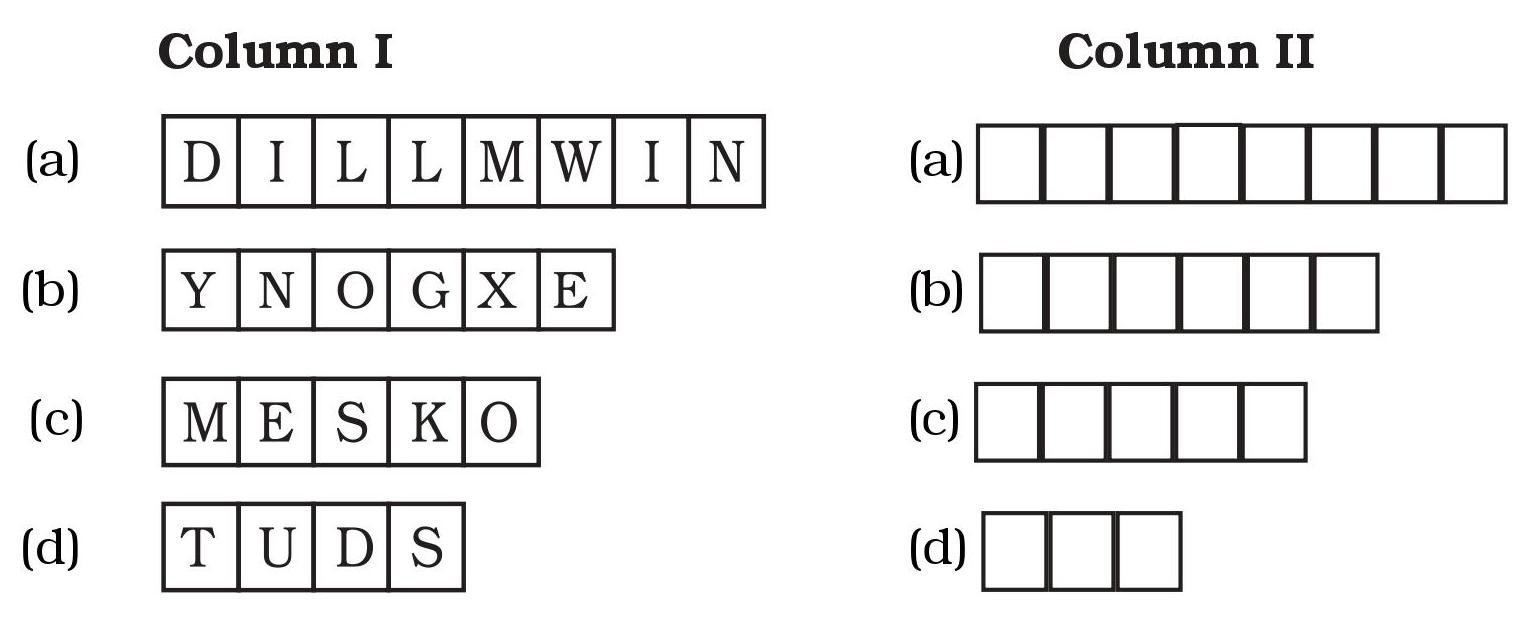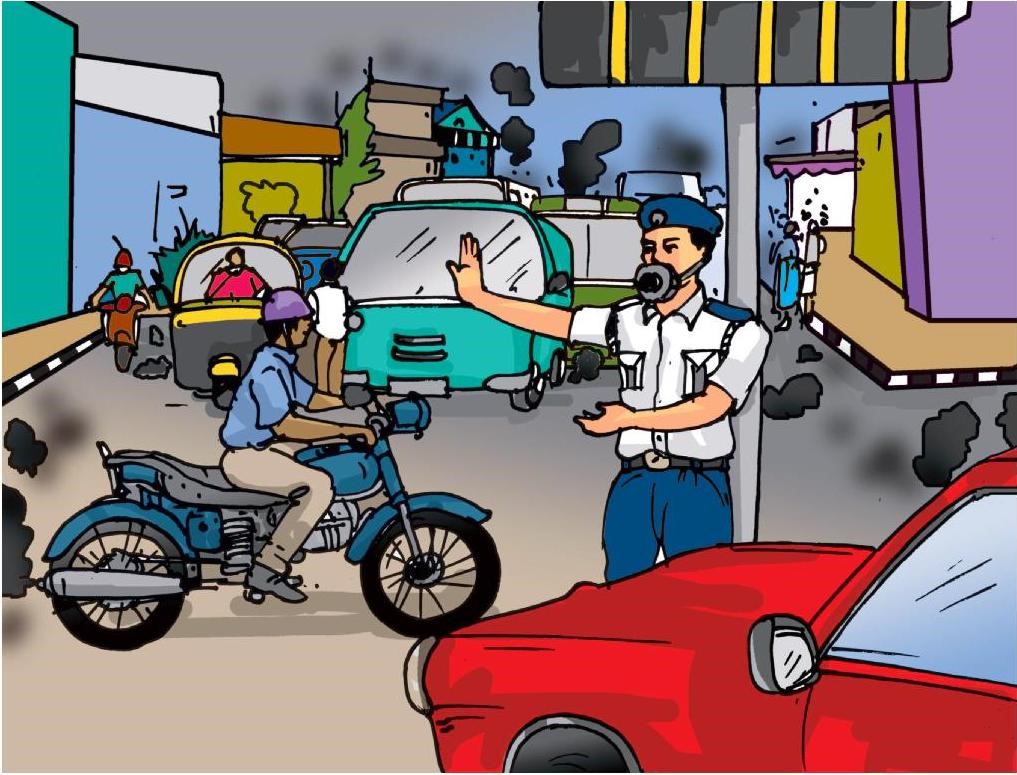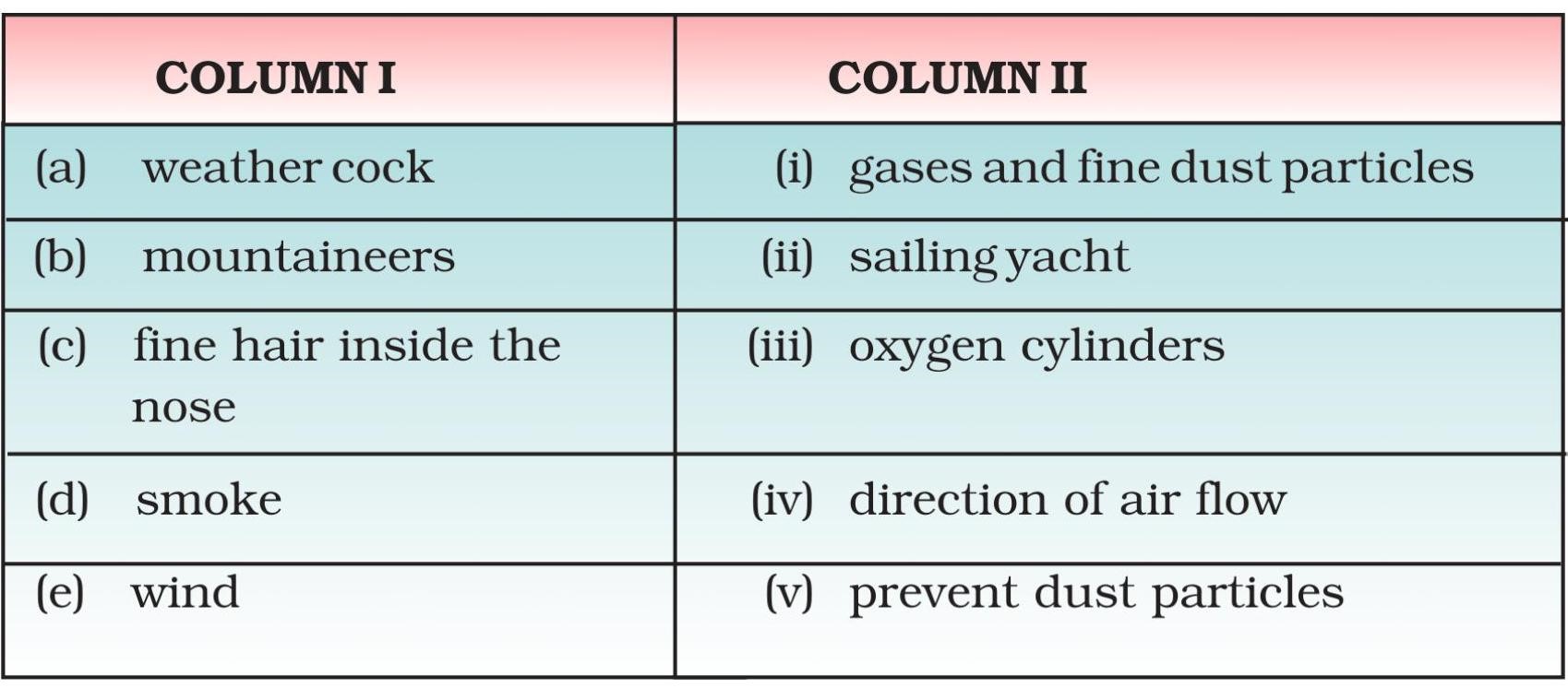Science
(www.olympiadsuccess.com)
Chapter 15: Air Around Us
Class: VI
Exemplar Solutions
Multiple Choice Questions
Question 1
Which of the following statements is incorrect?
(a) All living things require air to breathe.
(b) We can feel air but we cannot see it.
(c) Moving air makes it possible to fly a kite.
(d) Air is present everywhere but not in soil.
Answer 1
(d)
Question 2
Wind does not help in the movement of which of the following?
(a) Firki
(b) Weather cock
(c) Ceiling fan
(d) Sailing yacht
Answer 2
(c)
Question 3
What is not true about air?
(a) It makes the windmill rotate.
(b) It helps in the movements of aero-planes.
(c) Birds can fly due to presence of air.
(d) It has no role in water cycle.
Answer 3
(d)
Question 4
Mountaineers carry oxygen cylinders with them because
(a) there is no oxygen on high mountains.
(b) there is deficiency of oxygen on mountains at high altitude.
(c) oxygen is used for cooking.
(d) oxygen keeps them warm at low temperature.
Answer 4
(b)
Question 5
Boojho took an empty plastic bottle, turned it upside down and dipped its open mouth into a bucket filled with water. He then tilted the bottle slightly and made the following observations.
(i) Bubbles of air came out from the bottle.
(ii) Some water entered the bottle.
(iii) Nitrogen gas came out in the form of bubbles and oxygen got dissolved in water.
(iv) No bubbles formed, only water entered the bottle.
Which observations is/are correct?
(a) (i) and (ii) (b) (iv) only
(c) (iii) and (iv) (d) (i) only
Answer 5
(a)
Question 6
Which of the following components of air is present in the largest amount in the atmosphere?
(a) Nitrogen (b) Oxygen
(c) Water vapor (d) Carbon dioxide
Answer 6
(a)
Question 7
The components of air which are harmful to living beings are
(a) nitrogen and carbon dioxide.
(b) dust and water vapor.
(c) dust and smoke.
(d) smoke and water vapor.
Answer 7
(c)
Question 8
Usha took a lump of dry soil in a glass and added water to it till it was completely immersed. She observed bubbles coming out. The bubbles contain
(a) water vapor (b) only oxygen gas
(c) air (d) none of these
Answer 8
(c)
Very Short Answer Questions
Question 9
State whether the following statements are true or false. If false, correct them.
(a) Plants consume oxygen for respiration.
(b) Plants produce oxygen during the process of making their own food.
(c) Air helps in the movements of sailing yachts and glider but plays no role in the flight of birds and aero-planes.
(d) Air does not occupy any space.
Answer 9
(a) True
(b) True
(c) False, air also helps in the flight of birds and aero-planes.
(d) False, it does occupy space.
Question 10
In a number of musical instruments, air plays an important role. Can you name some such instruments?
Answer 10
Some examples of such instruments are as follows:
Flute, shahnai, harmonium.
Question 11
In the boxes of Column I the letters of some words got jumbled. Arrange them in proper form in the boxes given in Column II

Answer 11
(a) WINDMILL (b) OXYGEN
(c) SMOKE (d) DUST
Question 12
Make sentences using the given set of words.
(a) 99%, oxygen, nitrogen, air, together
(b) Respiration, dissolved, animals, air, aquatic
(c) Air, wind, motion, called
Answer 12
(a) Oxygen and nitrogen together make up 99 per cent of the air.
(b) Aquatic animals use dissolved air for respiration.
(c) Air in motion is called wind.
Short Answer Questions
Question 13
A list of words is given in a box. Use appropriate words to fill up the blanks in the following statements
Air, oxygen, wind, water vapor, mixture, combination, direction, road, bottles, cylinders.
(a) The ______ makes the windmill rotate.
(b) Air is a ______ of some gases.
(c) A weather cock shows the ______ in which the air is moving at that place.
(d) Mountaineers carry oxygen ______ with them, while climbing high mountains.
Answer 13
(a) wind (b) mixture (c) direction (d) cylinders
Question 14
Observe the picture given in Fig. 15.1 carefully and answer the following questions.

Fig.15.1
(a) What is covering the nose and mouth of the police man?
(b) Why is he putting a cover on his nose?
(c) Can you comment on air quality of the place shown in the Fig.15.1?
Answer 14
(a) Mask
(b) To save himself from dirt/polluted air.
(c) Air quality of the place is not good. It is due to the smoke and gases emitted by the
automobiles along with dust particles present in the air.
Question 15
Garima observed that when she left her tightly capped bottle full of water in the open sunlight, tiny bubbles were formed all around inside the bottle. Help Garima to know why it so happened?
Answer 15
Air dissolved in water starts escaping in the form of tiny bubbles due to heat from the sun.
Question 16
Match the items of Column I with the items of Column II

Answer 16
(a)– (iv); (b)– (iii); (c)– (v); (d)– (i); (e)– (ii)
Long Answer Questions
Question 17
Explain the following observations very briefly
(a) A firki does not rotate in a closed area.
(b) The arrow of weather cock points towards a particular direction at a particular moment.
(c) An empty glass in fact is not empty.
(d) Breathing through mouth may harm you.
Answer 17
(a) Lack of air movement.
(b) Shows the latest direction of the wind.
(c) Even the so called empty glass is not in fact empty. It is filled with air.
(d) You may inhale dust if present in air which may prove harmful.
Question 18
Write just a few sentences for an imaginary situation if any of the following gases disappear from the atmosphere
(a) oxygen
(b) nitrogen
(c) carbon dioxide
Answer 18
(a) There will be no life on earth.
(b) Things will burn very fast.
(c) The plants will not be able to prepare their food and hence there will be no life on earth.
Question 19
Paheli kept some water in a beaker for heating. She observed that tiny bubbles appeared before the water started to boil. She boiled the water for about 5 minutes and filled it in a bottle up to the brim and kept the bottle air tight till it cooled down to room temperature.
(a) Why did the tiny bubbles appeared?
(b) Do you think tiny bubbles will appear on heating the water taken out from the bottle? Justify your answer.
Answer 19
(a) Tiny bubbles appeared due to the evolution of air dissolved in water.
(b) No, tiny bubbles will not appear as there is no dissolved air in this water.
Question 20
On a Sunday morning Paheli’s friend visited her home. She wanted to see some flowering plants in the nearby garden. Both of them went to the garden. While returning from the garden they also observed some flowering plants on the road side. But to their surprise they found that the leaves and flowers of these roadside plants were comparatively very dull. Can you help them to know why?
Answer 20
The road side plants had probably some dust and soot deposited on them and thus appeared dull.
Yearlong program for Olympiads preparation & to build necessary skills for future.
Explore More
Time to mark your calendar with the upcoming Olympiads exam schedule.
Explore More
Take your Olympiad preparation to next-level by taking LIVE Classes.
Explore More
Assess your performance by taking topic-wise and full length mock tests.
Explore More
Online tuitions for international compeitions like SASMO, SEAMO, etc for Grades 1-11.
Explore More